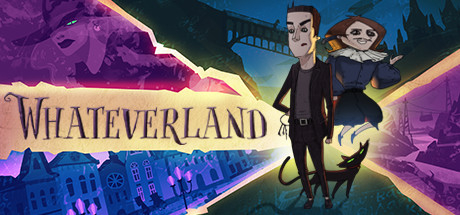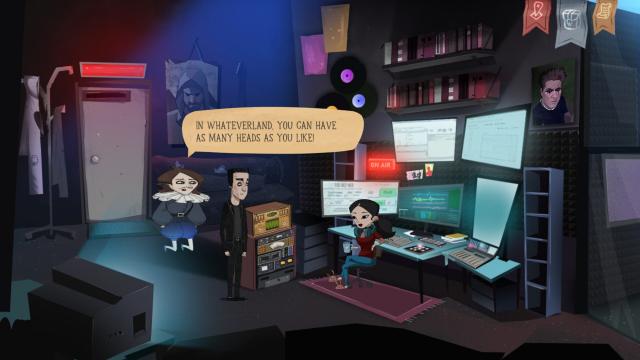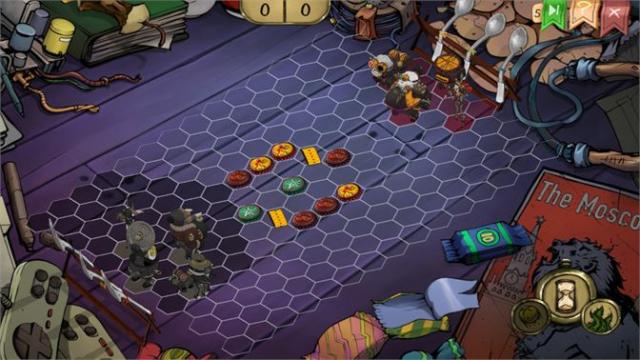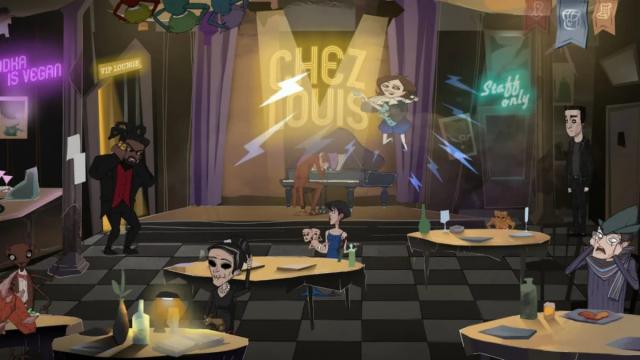Existing User Log In
New User Registration
Register for a free account to gain full access to the VGChartz Network and join our thriving community.





America - Front


America - Back

Caligari Games
Adventure
 (Add Date)
(Add Date) (Add Date)
(Add Date) (Add Date)
(Add Date)
| Owners: | 0 |
| Favorite: | 0 |
| Tracked: | 0 |
| Wishlist: | 0 |
| Now Playing: | 0 |
The sophomore title from Russian-based Caligari Games begins with a mysterious woman (voiced by the lovely Jess Robinson) narrating while surveilling a man stealing her prized necklace. Just as this sly cat burglar, Vincent, thinks he's home free, said woman reveals herself to be a witch and casts him into another world. No, he's not dead nor dying per se; rather, he's teleported to a purgatory befitting the title's namesake. It doesn’t take long to realize Whateverland operates on a different set of rules after grouping up with a floating Shakespeare At Home, Nick, and seeing someone try to unsuccessfully kill himself (again) by leaping off a bridge.
It doesn't dawdle in apprising you of the main goal. With no clear exit out (not even death), Vincent's only real option is in summoning his very captor. Acquiring Beatrice's incantation is no small task though. Since the spell page has been split into seven fragments, you must scour through and interrogate this sprawling town's Whateverlanders to find them. Whether you do this by succoring those in need or pilfering these pieces is up to you. Can one truly leave the lifestyle of a skilled thief behind?
For a point-n-click adventure, it's an alluring hook on paper: the non-linear flexibility for almost every fragment encourages freeform discovery and the morality choices thematically connect with how Vincent wound up there to begin with. To don my pretentious fedora for a moment, that "ludonarrative harmony" makes it feel like something more than a chance to have multiple endings – not to dismiss replayability either. Almost every location is immediately opened up too, so you can quickly know the lay of the land and internalize what each person wants in exchange for a fragment.
Interesting design decisions can only go so far with poor execution though. There's a Catch-22 with non-linearity: the ability to chart wherever, causing the player to lose track. To counteract this, Caligari opted to trim down complexity with a collection of mini-games. That isn't to say they’re poorly-designed, save one or two, but rather this turns most challenges into a standard pipe flow challenge or… something else that's boring just to talk about. Compared to more linear point-n-clicks that interlock various hints and useful items in a way that maintains momentum, it's simply the lesser approach while also reducing environmental brainteasers. Item-combining is also done automatically here, for the rare occasion you need to store more than one quest piece in your backpack.
Whateverland could've used more polishing for Vincent's arrival too. While I shouldn't exaggerate game-breaking bugs galore, there are so many sporadic nuisances ranging from gameplay to missing sound foley that can't be ignored. Various things you could supposedly view – marked by the toggled UI overlay – wouldn't register as a valid option. On top of a controller-cursor being… well, a laggard controller-cursor, it'd occasionally be drawn towards the wrong environmental cue; think of an aim assist steering you in the opposite direction. The hexagonal class-based board game, "Bells & Bones," would also have these odd moments of not registering button presses. Even though incorporating its importance into the story is nice, the rudimentary bones made me glad I kept finding the cheat tokens (Balls of Yarn). Even Caligari doesn't have faith in its longevity. 
Haphazard execution pervades everywhere else. Sure, the concept of escaping Tim Burton's Neverland is a great way to leverage kooky characters and world-building. Tying in someone's personality with the animal they could slowly transform into is also a neat concept. Since no one dies, Beatrice has accrued a varied list of characters over the centuries. For all of that build-up, it's a shame how unengaging most of them tend to be; plus, only a rare few voice actors nail their roles. One of its best character scenarios is setting up a couple for a first date despite mismatched languages: the club owner speaks in jazz (like talking jive in Airplane!), while you act as a translator. No other bit of character development feels fresh in my memory, which is saying a lot for a 4-5 hour adventure.
There’s no greater highlight into Whateverland's lack of character than the somnolent protagonist himself. I can't tell whether it's more down to Philip Champion's decaffeinated voice acting or misguided direction that makes him sap the color from every location; either way, opting for wet-cardboard personality with this delivery hardly ever works. From the corny japes leveled at his partner to monotone observations for everything, he carries so little flavor throughout all of it. And though it makes perfect sense to make Vincent the straight man to the ostentatious Shakespeare wannabe, their comradery is like a flat soda.
It's a genuine shame because the cogs of a beguiling offbeat story are present: cast into new world from an immoral act, potentially losing your original humanity depending on certain actions, and so on and so on. But, like a joke, you can’t truly sell it without good delivery. The inconsistent voice acting, droll humor that rarely lands, mostly milquetoast scenarios, and more plague its initial promise. I'd argue it's inconsistent with its own rules too. For a game that tries to thematically connect consequences with bad actions, the witch is negligent with her incredible power after learning more about this world. Which is apropos of the game too: it's unable to commit to a specific moral standard, thus feeling a bit hollow.
It's also not easy to connect with a world that's so… whatever. Even though I haven't gotten around to playing Caligari's first title, The Great Perhaps, the screenshots alone capture more inventiveness and wonder than what's seen here. There's something about the odd stenciling work for most characters and locations that makes these folks look like second-rate Tim Burton imitations. For a world meant to evoke magic borne from the mind of a captivating witch, it's odd how little Gothic and/or Surrealist architecture is utilized. Despite also feeling imitative of other works – and overly repetitive – at least Artem Vishnyakov's soundtrack tries to capture the right atmosphere.
For an adventure offering two distinct moral paths to explore, Whateverland has a hard time convincing you to just finish it once. It's a shame too since Caligari Games captures some neat design concepts: the setting's potential, a non-linear emphasis, benevolent/selfish morality decisions, and how those concepts thematically mesh together. Yet they only feel implemented at the surface level, while the fundamentals of puzzle-solving and… adventuring feel prosaic and occasionally buggy. Tied with several presentation shortfalls, the insipid end result makes the title seem like a Freudian slip.
Contractor by trade and writer by hobby, Lee's obnoxious criticisms have found a way to be featured across several gaming sites: N4G, VGChartz, Gaming Nexus, DarkStation, and TechRaptor! He started gaming in the mid-90s and has had the privilege in playing many games across a plethora of platforms. Reader warning: each click given to his articles only helps to inflate his Texas-sized ego. Proceed with caution.









